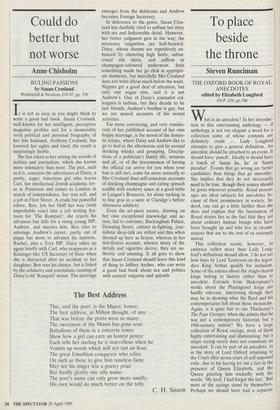Could do better but not worse
Anne Chisholm
RULING PASSIONS by Susan Crosland
Weidenfeld & Nicolson, £10.95, pp. 376
It is not as easy as you might think to write a good bad book. Susan Crosland, well-known for her intelligent, perceptive magazine profiles and for a memorably vivid political and personal biography of her late husband, Anthony Crosland, has lowered her sights and tried; the result is surprisingly feeble.
She has taken as her setting the worlds of politics and journalism, which she knows more intimately than most. The plot, such as it is, concerns the adventures of Daisy, a pretty, eager American girl who leaves Carl, her intellectual Jewish academic lov- er in Princeton and comes to London in search of independence, her true self, and a job in Fleet Street. A crude but powerful editor, Ben, lets her bluff her way (with improbable ease) into a job writing fea- tures for 'The Rampart'; she rejects his advances but falls for a rising young MP, Andrew, and marries him. Ben tries to sabotage Andrew's career, partly out of pique but more to advance his mistress, Rachel, also a Tory MP. Daisy takes up again briefly with Carl, who reappears as a Kissinger-like US Secretary of State when she is distracted after an accident to her daughter; Ben sees his chance, but is foiled by the solidarity and journalistic cunning of Daisy's old 'Rampart' mates. The marriage emerges from the doldrums and Andrew becomes Foreign Secretary.
In deference to the genre, Susan Cros- land has dutifully tried to suffuse her story with sex and fashionable detail. However, her better judgment gets in the way; the necessary vulgarities are half-hearted. Daisy, whose charms are repetitively en- hanced by clattering high heels, unbut- toned silk shirts, and saffron or champagne-coloured underwear, feels something inside her go click at appropri- ate moments, but mercifully Mrs Crosland does not write about much below the waist. Nipples get a good deal of attention, but only one organ stirs, and it is not Andrew's. One of Daisy's journalist col- leagues is lesbian, but they decide to be just friends; Andrew's brother is gay, but we are spared accounts of his sexual activities.
Far more convincing, and very reminis- cent of her published account of her own happy marriage, is the mood of the domes- tic scenes, where Daisy and Andrew like to go to bed in the afternoons and lie around drinking whisky and gossiping. Descrip- tions of a politician's family life, tensions and all, or of the tiresomeness of having the official car arrive for you when your hair is still wet, come far more naturally to Mrs Crosland than self-conscious accounts of drinking champagne and eating spinach souffle with anchovy sauce at a good table at Langan's Brasserie, let alone tucking in to foie gras in a suite at Claridge's before afternoon adultery.
Even the set-piece scenes, drawing on her own exceptional knowledge and ac- cess, fail to convince; Buckingham Palace, Downing Street, cabinet in-fighting, jour- nalistic shop-talk are stilted and thin when dressed up here as fiction, whereas in her non-fiction account, whence many of the details and vignettes derive, they are au- thentic and amusing. It all goes to show that Susan Crosland should leave this kind of thing to Jeffrey Archer, who can write a good bad book about sex and politics with natural vulgarity and aplomb.


















































 Previous page
Previous page